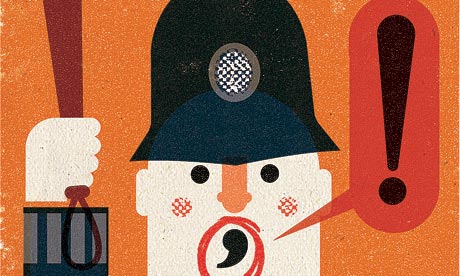
Think of the word "atrocity", and certain appalling behaviours spring to mind. Add "barbaric", and the picture gets worse. How about a barbaric atrocity that's "detestable" and provokes "horror"? At this point, it's surely time for a UN intervention. We must act to halt this outrage! Except that all the words just quoted come from discussions of the uses and abuses of English. Simon Heffer, in his recent book Strictly English, thinks the so-called "greengrocer's apostrophe" is an atrocity, and that academics write barbarically; William Zinsser's guidebook On Writing Well also condemns some usages as atrocities, and others as detestable. Meanwhile, contributors to a BBC debate on Americanisms earlier this year spoke of their "horror" and "hate" in reaction to phrases that made them "feel the rage rising". The debate about how far language ought to be allowed to evolve is an old one. But all this fury raises a more specific psychological question: what are people so angry about?
This is the topic of The Phenomenology of Error, a fascinating paper published 30 years ago by the linguist Joseph Williams, recently highlighted on the blog Lingua Franca. It's true that some of this language-policing is done humorously. But there's something weirdly disproportionate about it all. Most social annoyances are either invasions of space, as when someone jabs you with an elbow, or invasions of "psychic space", like chatting about your bowel troubles over dinner. But using a split infinitive, or "can I get" instead of "may I have", is neither. Yet "the language people use to condemn linguistic errors seems far more intense than the language they use to [condemn]… a hard bump on the arm," Williams writes. (To incite pub debates, try suggesting there's nothing wrong with "can I get". Hilarity will ensue.) Sometimes, an ulterior motive is obvious: the Plain English Campaign, which purports to fight for clarity, is shamefully eager to jump on made-up "PC gone mad" stories like the fuss about the BBC's use of BC and AD. But it's often less clear. "Deep psychic forces," Williams suspects, are at play.
A clue to the answer, he suggests, lies in the curious frequency with which the critics of "bad" English make the very errors they despise. EB White, who co-wrote The Elements Of Style, used "that" and "which" in violation of his own rules. Heffer, among various sins, condemns the passive voice but deploys it freely. (George Orwell did the same.) What this demonstrates, to simplify Williams's point, is that the "error-hunting" mindset is a way of relating to language that's utterly different than (from?) the one we normally use. Go looking for mistakes and you'll find them; don't look, and many won't impinge on your consciousness. Heffer et al, it seems, take the latter stance towards their own work. In his final paragraphs, Williams reveals his paper contains numerous deliberate errors. He asks his readers: did you spot them? Exactly.
So why adopt error-hunting mindset? Simply because "it feels more authentic when we condemn error and enforce a rule… what good is learning a rule if all we can do is obey it?" Anger delivers ego-enhancing pleasure; so does strengthening the boundaries of group membership – and carping about language is far more socially acceptable than explicit class snobbery or nationalism (not to mention less bother than confronting actual atrocities). Still, can we get, sorry, "may we have", a bit of perspective, please?
• oliver.burkeman@theguardian.com; twitter.com/oliverburkeman

